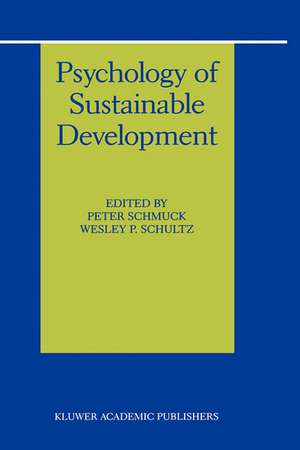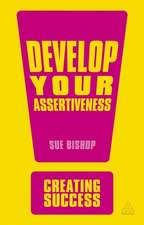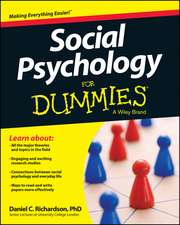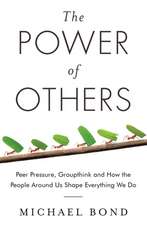Psychology of Sustainable Development
Editat de Peter Schmuck, Wesley P. Schultzen Limba Engleză Hardback – 29 apr 2002
The Psychology of Sustainable Development clarifies the meaning of the term and describes the conditions necessary for it to occur. With contributions from an international team of policy shapers and makers, the book will be an important reference for environmental, developmental, social, and organizational psychologists, in addition to other social scientists concerned with the impact current human activity will have on the prospects of future generations.
| Toate formatele și edițiile | Preț | Express |
|---|---|---|
| Paperback (1) | 1218.83 lei 6-8 săpt. | |
| Springer Us – 22 oct 2012 | 1218.83 lei 6-8 săpt. | |
| Hardback (1) | 1227.04 lei 6-8 săpt. | |
| Springer Us – 29 apr 2002 | 1227.04 lei 6-8 săpt. |
Preț: 1227.04 lei
Preț vechi: 1496.40 lei
-18% Nou
Puncte Express: 1841
Preț estimativ în valută:
234.87€ • 255.21$ • 197.42£
234.87€ • 255.21$ • 197.42£
Carte tipărită la comandă
Livrare economică 21 aprilie-05 mai
Preluare comenzi: 021 569.72.76
Specificații
ISBN-13: 9781402070129
ISBN-10: 1402070128
Pagini: 348
Ilustrații: X, 327 p.
Dimensiuni: 155 x 235 x 24 mm
Greutate: 0.71 kg
Ediția:2002
Editura: Springer Us
Colecția Springer
Locul publicării:New York, NY, United States
ISBN-10: 1402070128
Pagini: 348
Ilustrații: X, 327 p.
Dimensiuni: 155 x 235 x 24 mm
Greutate: 0.71 kg
Ediția:2002
Editura: Springer Us
Colecția Springer
Locul publicării:New York, NY, United States
Public țintă
ResearchDescriere
Human activity overuses the resources of the planet at a rate that will severely compromise the ability of future generations to meet their needs. Changes toward sustainability need to begin within the next few years or environmental deterioration will become irreversible. Thus the need to develop a mindset of sustainable development - the ability of society to meet its needs without permanently compromising the earth's resources - is pressing.
The Psychology of Sustainable Development clarifies the meaning of the term and describes the conditions necessary for it to occur. With contributions from an international team of policy shapers and makers, the book will be an important reference for environmental, developmental, social, and organizational psychologists, in addition to other social scientists concerned with the impact current human activity will have on the prospects of future generations.
The Psychology of Sustainable Development clarifies the meaning of the term and describes the conditions necessary for it to occur. With contributions from an international team of policy shapers and makers, the book will be an important reference for environmental, developmental, social, and organizational psychologists, in addition to other social scientists concerned with the impact current human activity will have on the prospects of future generations.
Cuprins
List of Contributors. Preface. What is Sustainable Development: and How Do We Get There? 1. Sustainable Development as a Challenge for Psychology; P. Schmuck, P.W. Schultz. 2. The Next Revolution: Sustainability; D. McKenzie-Mohr. 3. Social Dilemmas and Sustainability: Promoting Peoples' Motivation to 'Cooperate With the Future'; R. Osbaldiston, K.M. Sheldon. Individual Differences in Sustainable Behavior. 4. Inclusion With Nature: The Psychology of Human-Nature Relations; P.W. Schultz. 5. (En)gendering Sustainable Development; D. Du Nann Winter. 6. Sustainable Development and Emotions; E. Kals, J. Maes. 7. Why do People Act in Sustainable Ways? Results of an Empirical Survey of Lifestyle Pioneers; L. Degenhardt. Culture and Sustainability. 8. Self, Culture, and Sustainable Development; V.V. Gouveia. 9. Partnerships for Sustainability: Psychology for Ecology; P.H. Cock. 10. Sustainable Wildlife Utilization in Africa: A Contest Between Scientific Understanding and Human Nature; J.T. du Toit. 11. Environmental Sustainability by Sociocognitive Deceleration of Population Growth; A. Bandura. Exemplary Projects in Sustainable Development. 12. Motivating Collective Action: Converting to Sustainable Energy Sources in a German Community; S. Eigner, P. Schmuck. 13. Which Kind of Sustainability for a Social Environmental Psychology? B. Jiménez-Domínguez. 14. Using Organized Consumer Action to Foster Sustainability; M. Friedman. Conclusion. 15. SummarizingSustainability Issues and Research Approaches; S. Oskamp. Subject Index.
Recenzii
"[...]this book maps the four primary domains that need be considered to achieve sustainable development: economic, environmental, institutional/political, and social. Although the book presents a psychology viewpoint, it will benefit any interested reader in environmental studies."
(Electronic Green Journal, 18, 2003)
(Electronic Green Journal, 18, 2003)















